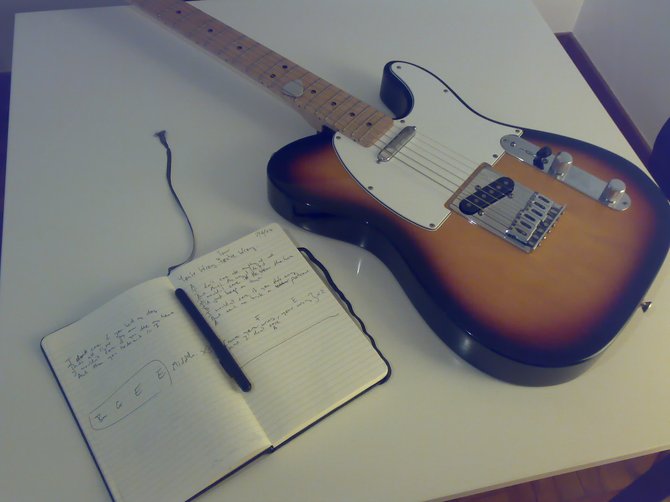Being a songwriter means sharing yourself with your listeners—for good or bad. Photo by Courtesy Flickr/Adrian F
Music and I have an understanding: I make it, and it makes me happy. That's a simple enough idea, I think. But sometimes, music has to go and cause problems in an otherwise cherished and beneficial relationship.
For instance, I've had the same lyric stuck in my head for a month. It has a simple enough melody--one that I could describe as "pretty" and still feel comfortably masculine, which is saying something. I want that lyric to drift out of my brain, through my mouth and into an effortlessly composed hit song. Is that so hard? Of course it is--extremely.
The real disconnect between me and music isn't a lyric that I can't seem to wrangle, though. I'm not ashamed to admit that I've had that issue plenty of times, although I would be fine with people perceiving me as an errorless lyrical genius if they wish. The problem is that songwriting can't promise lasting gratification, or at least, when it comes to the opinions of others, you shouldn't expect it to last.
Before I sound too anti-songwriting (which is a line I may have crossed a hundred words ago), I should make it clear that I love creating music, whether it is working alone or with a group of people that share, hopefully, a similar passion for songwriting. For me, it's a sort of two-fold fascination. I do write partly out of compulsion, which has definitely been said before, and also out of enjoyment, making something that I would want to hear.
I can't be the only one who feels exceptional in having someone say, "I know I could be listening to any number of other songs about the same concept, but this one speaks to me." In a lot of ways, that offers the most lasting, rewarding feeling. For a few weeks after hearing a positive comment, I'll push myself to look deeper, to get the most from those throwaway verses that slid by without me batting an eye. I want other people to have different but equally powerful experiences with my songs again and again until I'm old, happy and legendary, like Paul McCartney.
However, I also realize in that rosy view of things that, if I make the decision to share something with others, I open myself to negativity, even in the sometimes unwelcome guise of constructive criticism. I'm sure your musician friends all welcome a critique--as do I--because that's how you improve as a writer and performer, but if they say it wouldn't be easier to have someone hand them a Grammy instantly upon completing a song, they're lying.
I think making music is like cooking, to an extent. If I was a five-star chef, which believe me I am not (as countless burnt eggs can verify), I'd have just about the same options that I do as a songwriter. I can make something for myself and enjoy it immensely, if not be entirely fulfilled; I can share it with friends and family who love me enough to weather whatever I throw at them; or, scariest of all, I can serve it to the impartial audience, the people who don't care how long I worked on it.
In the immediacy of writing new music, whatever you create automatically becomes the best thing you've ever heard. You can only hope that someone else, someone less biased, will hear and love and latch onto it to find whatever meaning they can. There will always be another musician who has written something similar and another person who will invariably like that song better. But to at least a few listeners out there, you might hit a note cleaner or have a catchier hook or have one line that, for reasons unknown, just will not get unstuck from their heads.
That's both the good and bad thing about opinions. They can't be wrong.


